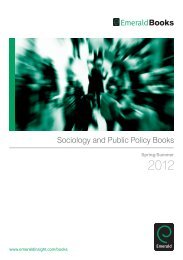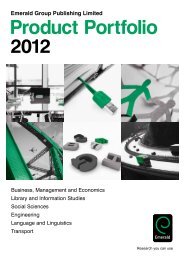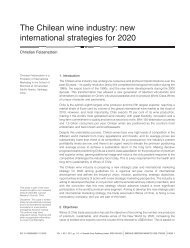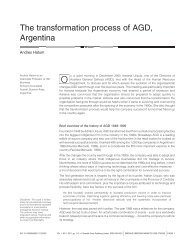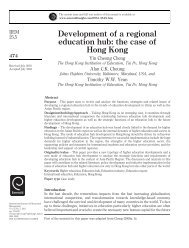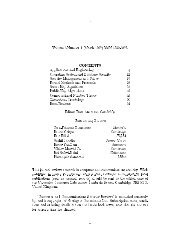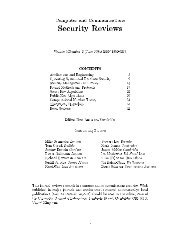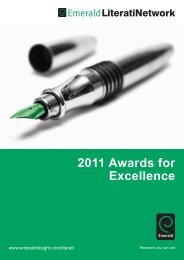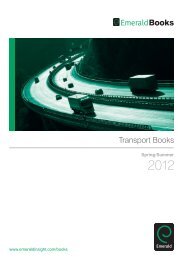Facilitating transdisciplinary sustainable development research ...
Facilitating transdisciplinary sustainable development research ...
Facilitating transdisciplinary sustainable development research ...
Create successful ePaper yourself
Turn your PDF publications into a flip-book with our unique Google optimized e-Paper software.
IJSHE<br />
11,1<br />
46<br />
Table I.<br />
Dissenting panellists<br />
Your<br />
experience<br />
with the<br />
e-dialogue<br />
changed your<br />
sense of<br />
connection<br />
with other<br />
participants<br />
You were<br />
accorded<br />
sufficient<br />
opportunity to<br />
contribute to<br />
the discussion<br />
The e-dialogue<br />
contributed to<br />
your<br />
understanding<br />
of the subject<br />
matter<br />
You regard<br />
this approach<br />
professionally<br />
significant Age<br />
You consider<br />
yourself to be<br />
highly<br />
experienced<br />
with<br />
computers<br />
Panellist 1 2 3 3 4 50 3<br />
Panellist 2 2 4 3 2 63 3<br />
Average 3.8 4.5 4.3 4.3 43 3.9<br />
e-panel build more slowly than with older participants. It is suspected that the digital<br />
divide is becoming more complex and is no longer about access, but rather, may be based<br />
on very different usages and values associated with the medium. For example, younger<br />
people, in their use of social networking sites based on personal relationships rather than<br />
professional use, ensure their privacy by creating other personas, and in some cases<br />
masking their real identities. It may well be that paradoxically their trust online is<br />
more “thin” than that of older colleagues. Although it took twice as long for trust to build,<br />
the pace and speed of their conversation increased exponentially nearer the end of the<br />
conversation. As well, their conversation was more targeted, shorter interventions,<br />
information-rich through web site citations, rather than longer reflective statements.<br />
Conclusion<br />
The authors were surprised and heartened by the very positive survey results, especially<br />
from participants new to the e-platform. The ubiquity of internet communications<br />
technology and increasing user sophistication could explain the lack of serious<br />
dissatisfaction with an e-platform that has not been significantly upgraded since 2004,<br />
although the team’s increasing sophistication in online dialogic techniques may also<br />
be a factor. Earlier phases of the first author’s <strong>research</strong> using e-dialogues had suggested<br />
anecdotally that there might be wider problems with use of this technology. This was<br />
not the case – although the survey does suggest there is a lingering but decreasing<br />
barrier for older users of the online environment. As well, the subsequent greater<br />
understanding and sophistication of internet users results in an enhanced online literacy<br />
that makes the software interface more opaque and less problematic, such as the time<br />
delay and sometimes lack of sequencing (threading) of the conversation.<br />
The <strong>research</strong> reveals that e-dialogues create a novel space for in-between disciplines,<br />
for cross disciplinary bridging, allowing for greater sustained interconnection over time,<br />
and can contribute to enhancing literacy and understanding modern day complex public<br />
policy issues. They may also provide a more novel space for inter and <strong>transdisciplinary</strong><br />
thought as we have nascent evidence that the medium is naturally more preferred by<br />
more lateral thinkers than literal thinkers, and perhaps leads to wider systems thinking,<br />
due to its tendency to stimulate more lateral thinking. It is difficult to determine,<br />
however, if this is a function of the medium, or a learning style of people attracted to<br />
participate, or both. The authors also believe that <strong>transdisciplinary</strong> e-dialogues have the<br />
capacity to speed the exploitation of knowledge between the <strong>research</strong> and practitioner



